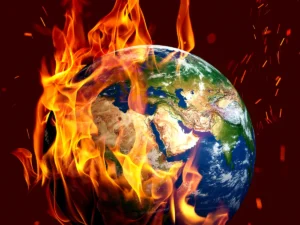Is World War 3 Coming? This is a question that has been on the minds of many people around the world in recent years. As global tensions rise between powerful nations, the fear of another world war has become more real than ever. But is this just another worry, or should we truly be concerned about the possibility of a major conflict breaking out in the near future?
In this blog post, we’ll explore what the signs of World War 3 might look like and discuss the factors that are currently influencing global politics. From rising military powers to economic struggles, there are many reasons people are wondering, is World War 3 coming? But it’s important to separate fact from fear, so let’s dive into what is really happening and what you can do to understand the bigger picture.
Is World War 3 Coming? Key Signs to Watch Out For
Is World War 3 Coming? This is a question that many people are asking as global tensions rise. There are several signs that may suggest the world is heading toward a large-scale conflict, but it’s important to understand what these signs mean.
First, we can look at the increase in military spending across the world. Countries like the U.S., China, and Russia are expanding their military capabilities, which can raise concerns. Bigger armies and more advanced weapons can sometimes lead to conflicts, especially if countries don’t trust each other.
Another sign is the rise in political and economic tensions. Issues like trade wars, disagreements over borders, and fights over resources are becoming more common. These disputes can sometimes spark bigger conflicts if they aren’t handled carefully.
While these signs might make us nervous, they don’t always mean that World War 3 is on the horizon. Many experts believe that countries today are more aware of the risks and try to avoid big wars through diplomacy.
How Global Tensions Could Lead to World War 3
Global tensions are at an all-time high, and many wonder how these could lead to World War 3. Some believe that growing disagreements between powerful countries like the U.S., China, and Russia could escalate into a large-scale war.
One of the main causes is the competition for global resources. Countries are fighting for oil, water, and other valuable materials that are needed for their economies. When resources are scarce, tensions can easily rise, leading to conflicts. These types of fights have sparked wars in the past and could lead to even bigger ones in the future.
Another factor is cyber warfare. In today’s world, technology has become an important tool for power. If one country were to hack another, it could lead to a serious conflict. Cyber-attacks on government systems or critical infrastructure might be the beginning of something much larger.
What Can Help Prevent Global Tensions from Turning Into War?
- Better communication between countries can reduce misunderstandings.
- Diplomatic efforts and peace talks can solve problems before they get worse.
- International organizations, like the United Nations, can mediate and prevent escalations.
What Are the Real Causes Behind the Fear of World War 3?

The fear of World War 3 is not just about military power; it’s about the changing world order. As new global powers rise, older powers feel threatened. This creates a situation where nations might act aggressively to protect their interests.
One of the key causes of fear is the growing competition for global leadership. China, for example, is becoming a major player on the world stage, which worries the U.S. and some European countries. When nations compete for leadership, it can lead to tension, and sometimes, these tensions spill over into conflict.
Economic challenges also play a big role. When countries face financial crises or economic instability, it’s easier for political leaders to blame other nations for their problems. This can lead to conflicts, as countries try to protect their own economy at the expense of others.
Despite these fears, it’s important to remember that the world today is different from the past. With global communication, nuclear weapons, and powerful alliances, nations are more likely to work together to avoid a world war.
The Role of Major Superpowers in the Potential of World War 3
The role of major superpowers like the United States, China, and Russia is critical when considering the question, is World War 3 coming? These countries have the most military and economic power, and their decisions can either prevent or ignite large-scale conflicts.
The U.S. has traditionally been a leader in global politics, but China’s rapid growth is challenging that role. The competition between the two powers is often seen in trade wars, military build-ups, and influence over other countries. If these tensions are not managed carefully, they could lead to a serious conflict.Russia, on the other hand, is also a significant player on the world stage. Its involvement in conflicts like in Ukraine has raised concerns about its intentions. If Russia were to get involved in a larger conflict with NATO countries, it could spark a much bigger war.
Despite this, it’s important to recognize that most superpowers understand the risks of a world war. They know that a full-scale war would cause massive destruction, and they would likely seek to avoid it at all costs.
What Are Superpowers Doing to Avoid World War 3?
- Engaging in diplomatic talks and peace treaties.
- Reducing military tensions through disarmament agreements.
- Collaboration in global organizations to address common problems.
Can Diplomacy Stop World War 3? What World Leaders Are Doing

While it may seem like the world is on the brink of a great war, diplomacy has played a key role in avoiding it. Many world leaders believe that World War 3 is not inevitable, and they work hard to prevent it through peaceful negotiations.
Leaders from all over the world meet regularly in international forums, like the United Nations, to discuss issues and find peaceful solutions. These diplomatic efforts often prevent small disputes from turning into larger conflicts. Through dialogue and compromise, countries can address their problems without resorting to war.
Another important tool for diplomacy is sanctions. Countries that break international laws or act aggressively can be punished through economic sanctions. These sanctions hurt their economy and push them to find peaceful solutions to conflicts.
How Diplomacy Can Prevent War:
- Direct talks between leaders can solve disputes before they grow.
- International pressure helps countries stay peaceful and avoid conflict.
- Peace treaties create rules and agreements that reduce the chances of war.
Could World War 3 Be Avoided? Lessons from History
Many people wonder, is World War 3 coming? But history shows that it is possible to avoid major conflicts. After both World Wars, countries around the world came together to create organizations like the United Nations, designed to prevent future wars. These efforts have kept the peace for many years.
It’s important to learn from the past. In World War 1 and 2, small conflicts quickly spread into global wars. Today, the world is more interconnected, and countries understand that fighting could lead to complete destruction. Modern diplomacy, technology, and alliances help ensure that war is not the first option.
Still, the future of peace is not guaranteed. It’s up to all countries to continue working together to solve problems peacefully and keep World War 3 from becoming a reality.
Conclusion
In conclusion, the question “Is World War 3 coming?” has many people worried, but it’s important to remember that war isn’t the only option. While global tensions are rising, countries today have many tools, like diplomacy and international organizations, to help avoid a big conflict. Leaders know that war can hurt everyone, and they work hard to find peaceful solutions to problems.
Though we can never be completely sure about the future, history has taught us that we can prevent wars if we work together. By learning from the past and making smart choices, we can reduce the risk of World War 3. The key is communication, cooperation, and always striving for peace.
FAQs
Q: Is World War 3 coming soon?
A: No one can predict the future, but current global tensions don’t guarantee a world war. Diplomacy and peace efforts are working to prevent it.
Q: What are the main causes of World War 3?
A: Tensions over resources, political disagreements, and competition between powerful nations are the main causes that could lead to conflicts.
Q: How can we stop World War 3 from happening?
A: Countries can work together through peaceful talks, treaties, and avoiding military conflicts. International organizations also play an important role in keeping peace.
Q: Are superpowers responsible for starting World War 3?
A: Superpowers can contribute to tensions, but they also have the power to prevent war through diplomacy and cooperation with other countries.
Q: What role does technology play in avoiding war?
A: Technology helps countries communicate quickly, track potential threats, and engage in cyber defense to prevent misunderstandings or attacks.
Q: Can diplomacy prevent World War 3?
A: Yes, diplomacy is one of the strongest tools to avoid war. By talking through problems and making agreements, countries can solve issues peacefully.



